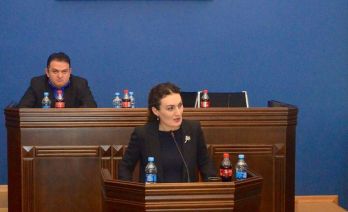- Public Information
- STRATEGIC DOCUMENTS
- NOTIFICATION FOR THE IMPLEMENTATION OF EMERGENCY HUMANITARIAN ASSISTANCE IN OCCUPIED TERRITORIES
- NOTIFICATION FOR INTERGOVERNMENTAL/DEVELOPMENT ORGANIZATIONS OPERATING IN OCCUPIED TERRITORIES
- NOTIFICATION FOR THE IMPLEMENTATION OF NON-EXEMPT ACTIVITIES IN OCCUPIED TERRITORIES OF GEORGIA
- NOTIFICATION ON ENTERING THE OCCUPIED TERRITORIES
- GENEVA INTERNATIONAL DISCUSSIONS
- INCIDENT PREVENTION AND RESPONSE MECHANISM (IPRM)
Mrs. Ketevan Tsikhelashvili Gave a Presentation before the Parliamentary Committee on Human Rights
17 February 2016
 The First Deputy State Minister for Reconciliation and Civic Equality delivered a speech before the Parliamentary Committee on Human Rights and Civil Integration. Mrs. Ketevan Tsikhelashvili gave an overview of the implemented activities for the fulfillment of the recommendations of the Public Defender. The Public Defender (Ombudsman) Mr. Ucha Nanuashvili took part into the meeting as well.
The First Deputy State Minister for Reconciliation and Civic Equality delivered a speech before the Parliamentary Committee on Human Rights and Civil Integration. Mrs. Ketevan Tsikhelashvili gave an overview of the implemented activities for the fulfillment of the recommendations of the Public Defender. The Public Defender (Ombudsman) Mr. Ucha Nanuashvili took part into the meeting as well.The First Deputy State Minister noted that the recommendations of the Public Defender concerned a number of essential topics: support to civil integration, human rights protection in the occupied territories, protection of human rights for the local population near the dividing line and implementation of specific projects in support of their social and economic empowerment.
Mrs. Ketevan Tsikhelashvili gave a detailed overview of the State Strategy on Civic Equality and Integration and its respective Action Plan for 2015-2020. She emphasized that the documents are based on the principle of equality which creates equal conditions for each citizen in a view of self-fulfillment.
The First Deputy State Minister declared that the State Strategy and the Action Plan are based on four basic areas – increased political and economic participation, quality in education, state language teaching, access to media and information.
Mrs. Ketevan Tsikhelashvili also delivered information on the projects that are implemented in Kvemo Kartli and Samtkshe-Javakheti regions in the light of the recommendations of the Public Defender.
The First Deputy State Minister also spoke about the activity of the Working Group on Humanitarian Issues at Geneva International Discussions through which the Georgian Delegation, chaired by Mrs. Tsikhelashvili, supports the protection and fulfillment of the rights of IDPs and residents of occupied territories. Specifically, the First Deputy State Minister declared, that Georgian Delegation pursues realistic policy to tackle the issues of safe and dignified return of IDPs, teaching of Georgian language in Gali district and freedom of movement.
Mrs. Ketevan Tsikhelashvili also provided information on the activities that are implemented by the Temporary Commission for the Needs of Villages, located near the dividing line. In particular, she noted, that Commission has conducted work to solve the problems of potable water and irrigation system in the villages of Gori, Kareli, Kaspi and Khashuri municipalities.
“As a part of the Commission activity, the population who lives near the dividing line – each family – shall receive GEL 200 for winter. Also, the students who live in these villages, are enabled to receive funding for higher education from the state budget. 23 villages have ambulances for qualified medical treatment; school infrastructure is now refurbished, with libraries and internet facilities that are under construction,” – Mrs. Ketevan Tsikhelashvili declared.
Mrs. Tsikhelashvili also noted, that compared to 2014, the number of patients who are entitled for medical treatment has considerably increased from the overall population of Abkhazia and South Ossetia. According to Mrs. Tsikhelashvili, this is owing to the high-quality healthcare sector in Georgia.
Mrs. Tsikhelashvili responded to the questions of Public Defender’s Office and the members of the Committee as well.









